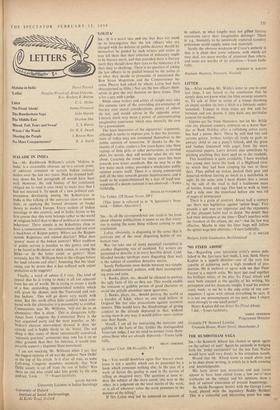'LOLITA'
SIR,—it is a novel idea and one that does not stand up to investigation that the law officers who are 'charged with the defence of public decency should let themselves be guided by such writers and critics as may tell them that their criterion of indecency ought to be literary merit, and that provided there is literary merit they should close their eyes to the indecency it is their duty to challenge. There is no question of asking the law officers to be guided instead by the police as to what they decide to prosecute. (1 mentioned the Bow Street Magistrate and the Commissioner be- cause Pharos had asked by whom Lolita had been characterised as filthy.) Nor are the law officers them- selves to give' the real decision on these issues. That is for a jury with a judge.
While some writers and critics of weight may take this extreme view of the overriding pre-eminence of literary over moral considerations, plenty of others do not, and would advise in the opposite sense. Literary merit may mean a power of communicating imaginative experience which may intensify the case for a prosecution. The least impressive of the signatories' a'rguments, although it seems to impress you, is that the prosecu- tions of today may not commend themselves to the public opinion of tomorrow. If thanks to the im- munity of Lolita, readers a few years hence take these rapings of little girls, or other perversions. as normal plots for novels, they will wonder what the stir was about. Certainly the trend for many years has been towards ever lower standards. But we may be at the low water mark today. provided a wholesome public opinion asserts itself. There is a strong commercial pull all the time towards greater licentiousness, and it needs to be counterbalanced by a fear of legal 'con• sequences if a decent restraint is not observed.—Yours faithfully,
DOUGLAS WOODRUFF The Tablet, 128 Sloane Street, SW I [This letter is referred to in 'A Spectator's Note- hook.'—Editor, Spectator.]






































 Previous page
Previous page